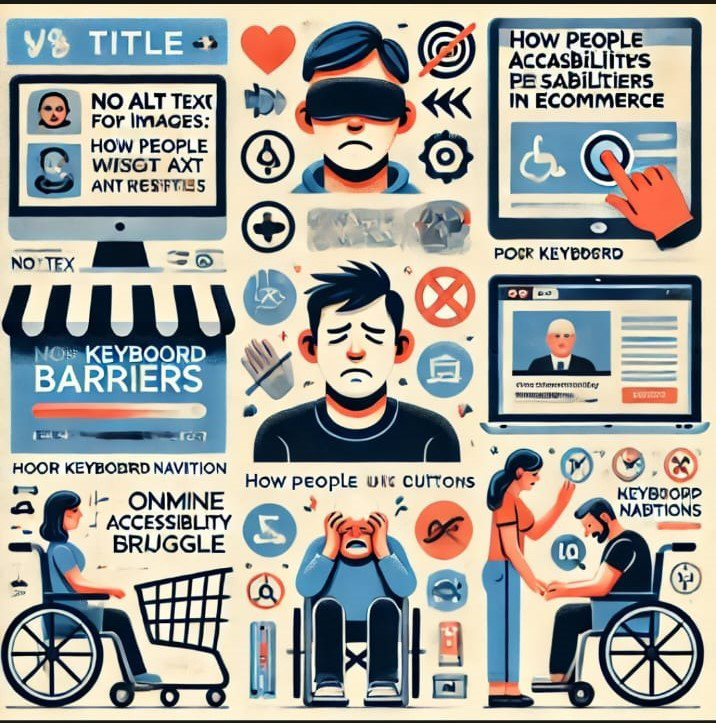The rise of ecommerce has transformed the way people shop, offering convenience and accessibility like never before. It is more about people’s comfort while they shop. However, for millions of individuals with disabilities, navigating online stores remains a challenge due to substandard website accessibility.
This has led to a surge in lawsuits against online retailers under Title III of the Americans with Disabilities Act (ADA).
Here is this image that shows the struggles of individuals with disabilities when they explore online content:

Understanding ADA Title III and its application to ecommerce!
The Americans with Disabilities Act (ADA) is a landmark civil rights law enacted in 1990 to prohibit discrimination against individuals with disabilities. Title III of the ADA specifically applies to “public accommodations”, requiring businesses that serve the public to ensure accessibility.
While initially ADA did not explicitly mention digital accessibility due to limited usage of technology by that time. However, the laws have evolved over time and government has increasingly enforced the law to all public accommodating digital platforms. Therefore, online stores or ecommerce require to be accessible since they cater to various segments of users through their products and services.
Online retailers facing more lawsuits – A serious problem of concern!
In recent years, lawsuits against online retailers have surged and the reason is nothing but failing to comply with web accessibility standards. Let’s understand:
- Growing awareness of digital rights
With the increasing reliance on ecommerce, disability rights advocates and consumers with disabilities are becoming more aware of their rights under the ADA. Thereby many are taking legal actions against online stores that fail to offer accessible experience.
- Lack of clear federal regulations
Although the DOJ has stated that ecommerce websites must be accessible, it has not issued clear federal guidelines under the ADA. As a result, courts often rely on Web Content Accessibility Guidelines (WCAG), the internationally recognized standards for digital accessibility, to determine compliance. This legal uncertainty has led to more lawsuits as ecommerce stores struggle to interpret their obligations.
- Precedents set by high-profile cases
Several major retailers, including Domino’s Pizza, Nike, and Winn-Dixie, have faced lawsuits over inaccessible websites. The Domino’s Pizza case, for instance, went up to the Supreme Court, where the company lost its appeal, reinforcing the notion that digital accessibility is a legal requirement. These cases have emboldened more consumers and advocacy groups to file lawsuits.
- Rise in “Surf-By lawsuits”
“Surf-By lawsuits” refers to cases where individuals or law firms search for inaccessible websites and file lawsuits against them even if they never intended to use the site. For instance, a visually impaired user visits an online store and finds that the checkout process is not compatible with screen reader and file a lawsuit even if they had no prior intent to shop there.
Major concern is many businesses encounter multiple lawsuits from different plaintiffs over similar accessibility issues. It increases their legal costs and pressure to improve website accessibility.
- Increased use of assistive technologies
As more users depend on assistive technologies like screen readers, voice commands, etc., more people encounter barriers, increasing the number of lawsuits when businesses fail to comply.
Consequences of web inaccessibility refers to a wide array of aftermaths!
Failing to comply with ADA accessibility standards can result in:
- Businesses may have to pay hefty amount in legal fees and settlements.
- Negative publicity can harm a company’s brand and customer trust.
- Inaccessible websites alienate millions of disabled consumers, leading to lost revenue.
- The DOJ and state attorneys general begin taking actions against companies with inaccessible websites, which ultimately impact business progress.
Online retailers ought to comply with ADA – it's a Hobson's choice for them!
To avoid lawsuits and make their ecommerce platforms more inclusive, online retailers require to take proactive steps:
- Follow WCAG standards
The Web Content Accessibility Guidelines (WCAG 2.1 or 2.2) provide a roadmap for making websites accessible. Key aspects include:
- Including text alternatives for images, videos, and other non-text content.
- Ensuring keyboard navigability so users those cannot use the mouse can navigate content easily.
- Offering clear and consistent navigation on each page is crucial for ease of use.
- Making forms accessible with proper labels and instructions.
- Conduct regular accessibility audits
Online stores must be audited regularly to evade accessibility crisis. Automated tools like Skynet Accessibility Checker, WAVE, Axe, or Google Lighthouse can be used initially and then manual website accessibility testing to ensure screen readers’ accessibility and to ensure no other issue has been left in automated testing.
- Implement an accessibility statement
Publishing an accessibility statement on the website shows commitment to inclusivity and provides a contact point for users experiencing accessibility issues.
- Train developers and designers
Ensuring that web designers, developers, and content teams are trained in accessibility best practices can prevent compliance issues from arising in the first place. It also creates an inclusive environment where everybody understands the struggle people with disabilities face.
- Consider third-party accessibility services
Online retailers can work with expert accessibility consultants or use AI-powered accessibility solutions to improve compliance. However, relying solely on overlay widgets (like automated accessibility plugins) may not be sufficient and can still lead to legal issues.
Wrapping up
The surge in ADA lawsuits against online retailers is a wake-up call that digital accessibility is essential now. To attract, engage, and retain modern customers, it is important to recognize the need of accessibility implementation. The more equal opportunities an online store will offer, the lesser legal consequences it will face.
However, ignoring accessibility can result in legal battels, reputational damage, and lost customers. Thus, proactively adopt WCAG standards, conduct regular audits, and foster an inclusive digital environment. These are straightforward strategies for online retailers to turn accessibility compliance into a competitive advantage rather than a legal liability.
Improving ADA Title III compliance is no longer optional for ecommerce businesses - it’s essential. With lawsuits on the rise, investing in full ecommerce accessibility can protect your business while enhancing the shopping experience for all users. At Skynet Technologies, we provide comprehensive website accessibility solutions, from audit and remediation to VPAT, ACR, and ongoing compliance monitoring and support. Reach out [email protected] for more information.


